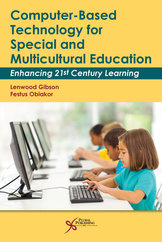Publication
Computer-Based Technology for Special and Multicultural Education
Enhancing 21st Century Learning
- Edited by: Lenwood Gibson, Festus Obiakor
- Details:
- 325 pages, Illustrated (B/W), Softcover, 6 x 9"
- ISBN13:
- 978-1-59756-942-2
- Release Date:
- 10/11/2017
Overview
Computer-Based Technology for Special and Multicultural Education is a comprehensive textbook for integrating computer technology into the classroom. Experienced contributors discuss the growing role of technology in teaching students with exceptional learning needs. Unlike the competition, this textbook addresses classroom technology through multiple lenses: special and multicultural education.
Special education teacher candidates, at all levels, will benefit from this in-depth coverage of history, terminology, and research in computer based technology. This background will help readers determine how and when to use technology for the most effective educational experience. Topics include using the combination of computer hardware and specific software programs to deliver evidence-based teaching strategies as supplemental instruction.
Computer-Based Technology breaks down teaching methods by addressing the most critical academic areas: reading, writing, mathematics, S.T.E.M., and social studies. Authors acknowledge the differences in each academic area, and how to best incorporate technology into each of these classrooms.
Authors use the term "exceptional learners" throughout the text, which describes not only special education students, but also the experience of students with culturally and linguistically diverse backgrounds. These students are faced with unique circumstances and challenges that affect their educational processes. Readers will learn how to use technology to enhance culturally relevant pedagogy, cooperative learning strategies, and the experience of English language learners.
Key features:
- The latest recommendations for websites, mobile applications, and resources for classroom technology
- Strategic plans for the most effective use of technology in the classroom
- In-depth discussions of special education and multicultural learners
- Classroom-specific approaches for technology in reading, writing, mathematics, S.T.E.M. and social studies
Preface
Contributors
Part I. The Use of Computer-Based Technology to Enhance Instructional Strategies
Chapter 1. Introduction to Computer-Based Technology for Education
Lenwood Gibson
Chapter 2. Benefits of Using Computer-Based Technology for Special Education and Multicultural Education
Festus Obiakor, Sunday O. Obi, and Lenwood Gibson
Part II. Enhancing Instruction for Students with Academic Needs
Chapter 3. Computer-Based Strategies to Improve Reading Skills
Lenwood Gibson and Shobana Musti-Rao
Chapter 4. Enhancing Instruction for Students with Academic Needs: Strategies for Writing Skills
Mary Theresa Kiely
Chapter 5. Technology Integrated Mathematics Interventions for CLD Students with Math Difficulties
Sun A. Kim and Andrea S. Kim
Chapter 6. Strategies for Science, Technology, Engineering, and Mathematics (STEM) Skills
Tolulope O. Salami and Elizabeth O. Omiteru
Chapter 7. Its a Different World: Making Social Studies Accessible to Marginalized Populations
Christopher D. Yawn, Temple S. Lovelace, and Amil N. T. Cook
Part III. Meeting the Unique Needs of Culturally and Linguistically Diverse Students
Chapter 8. Using Computer-Based Technology to Enhance Culturally Relevant Pedagogy
Morris Council, Lenwood Gibson, and Gwendolyn Cartledge
Chapter 9. Using Computer Technology to Enhance Cooperative Learning Strategies
Sunday O. Obi
Chapter 10. Addressing the Communication Needs of English Language Learners
Michelle A. Ocasio and Grażyna Walczak
Index
About The Editors
Lenwood Gibson Jr. is an associate professor of Special Education at Queens College (City University of New York). He received his M.S. in Applied Behavior Analysis from Northeastern University and his Ph.D. in Special Education from The Ohio State University. Dr. Gibsons area of expertise is in the identification and treatment of behavioral deficits for high risk student populations. His current research interests include: (a) the use and effectiveness of computer-assisted instruction as a supplemental tool for students at-risk for academic failure, particularly in urban schools; (b) closing the academic achievement between minority students and their non-minority peers; (c) closing the research to practice gap between effective, research-based strategies and the degree to which special education teachers use them with their daily instruction.
Festus E. Obiakor, PhD., is the Chief Executive Manager, Sunny Educational Consulting, Shorewood, Wisconsin. He has served as Department Head and Professor at Valdosta State University, Valdosta, Georgia and The City College of New York, New York. A teacher, scholar, leader, and consultant, he has served as Distinguished Visiting Professor at a variety of universities. He is the author of more than 150 publications, including books, articles, and commentaries; and he has presented papers at many national and international conferences. He serves on the editorial boards of reputable nationally and internationally refereed journals, including Multicultural Learning and Teaching (MLT) in which he serves as Executive Editor. Dr. Obiakor is a leader who has been involved in many landmark scholarly works in the fields of general and special education, with particular focus on African Americans and other culturally and linguistically diverse (CLD) learners. He continues to prescribe multidimensional methods of assessment, teaching, and intervention for these individuals. Based on this premise, Dr. Obiakor created the Comprehensive Support Model (CSM), an intervention model that values the collaborative, consultative, and cooperative energies of students, families, teachers/service providers, communities, and government agencies.
Related Titles
Augmentative and Alternative Communication
320 pages, Illustrated (B/W), Softcover, 7 x 10"
Educating Students with Autism Spectrum Disorder
Joshua K. Harrower, Louis G. Denti, Marcia Weber-Olsen
245 pages, Illustrated (B/W), Softcover, 7 x 10"
Educating Latino Preschool Children
232 pages, Illustrated (B/W), Softcover, 6 x 9"
Increasing Language Skills of Students from Low-Income Backgrounds
480 pages, Illustrated (B/W), Softcover, 6 x 9"
Hearing Assistive and Access Technology
Samuel R. Atcherson, Clifford A. Franklin, Laura Smith-Olinde
320 pages, Illustrated (B/W), Softcover, 7 x 10"















